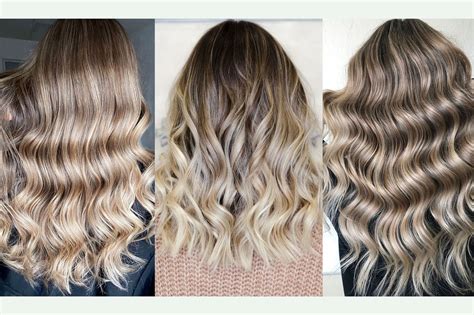Introduction
Gradient hair dyeing techniques have taken the hair world by storm, with both ombre and balayage offering stunning ways to create a dimensional, sun-kissed look. But what’s the difference between these two popular methods? Let’s dive into the details and help you decide which one is right for you.

Ombre vs. Balayage: Key Differences
1. Transition Placement
- Ombre: Gradual transition from dark roots to lighter tips, with a more defined horizontal line where the colors meet.
- Balayage: Seamless and subtle transition from darker to lighter shades, creating a more blended and natural-looking effect.
2. Coloring Method
- Ombre: Bleach or color is applied to the lower half of the hair, usually above the ears. The hair is then blended at the transition point.
- Balayage: Hand-painted bleach or color is applied to select strands of hair, creating a more free-form and personalized look.
3. Color Intensity
- Ombre: Can create a more dramatic contrast between root and tip colors, especially with bold transitioning shades.
- Balayage: Produces a softer, more subtle blend of shades, with less contrast between the colors.
4. Maintenance
- Ombre: Requires touch-ups every 6-8 weeks to maintain the transition line between colors.
- Balayage: Grow-out is less noticeable and requires less frequent touch-ups (every 8-12 weeks).
5. Suitability
- Ombre: Best suited for long or mid-length hair; can be customized for different levels of contrast.
- Balayage: More versatile, suitable for any hair length or texture; can create various looks from subtle to bold.
Pros and Cons of Ombre vs. Balayage
Ombre
Pros:
- Creates a dramatic and eye-catching look.
- Can be customized to suit different hair lengths and colors.
- Enhances the illusion of length in long hair.
Cons:
- Requires frequent touch-ups to maintain the transition line.
- Can be more difficult to blend naturally.
Balayage
Pros:
- Produces a natural and seamless blend of colors.
- Requires less frequent touch-ups.
- Can create various looks, from subtle to bold.
Cons:
- Can take longer to apply and require more skill.
- May not achieve a dramatic contrast in color like ombre.
Cost Considerations
The cost of ombre or balayage can vary depending on factors such as:
- Hair length and thickness
- Number of colors used
- Skill and experience of the stylist
On average, expect to pay between $150-$300 for a full ombre or balayage treatment.
Which Technique is Right for You?
Choosing between ombre and balayage depends on your desired look and hair type.
- If you prefer a bold and dramatic contrast, and have long or mid-length hair, ombre is a good option.
- If you want a natural and seamless blend of colors that’s low-maintenance, balayage is the better choice.
Tips for Choosing a Salon
- Look for experienced stylists who specialize in gradient hair techniques.
- Consult with the stylist to determine the best technique for your hair type and desired look.
- Ask for examples of their previous work in ombre or balayage.
Home Care for Ombre and Balayage Hair
- Use color-safe shampoos and conditioners to preserve the color.
- Avoid heat styling to prevent damage and color fading.
- Deep condition your hair regularly to maintain hydration.
Conclusion
Whether you opt for ombre or balayage, these gradient hair techniques are sure to elevate your look with a touch of radiant color. By carefully considering the differences between these methods, you can choose the one that best suits your style and hair needs. Enjoy the transformative journey to gorgeous, sun-kissed locks!
Table 1: Ombre vs. Balayage Comparison
| Characteristic | Ombre | Balayage |
|---|---|---|
| Transition Placement | Gradual, horizontal line | Seamless, blended |
| Coloring Method | Bleach or color applied to lower half of hair | Hand-painted, select strands |
| Color Intensity | Dramatic contrast | Subtle blend |
| Maintenance | Touch-ups every 6-8 weeks | Touch-ups every 8-12 weeks |
| Suitability | Long or mid-length hair | Any hair length or texture |
Table 2: Gradient Hair Techniques Market Statistics
| Metric | Value |
|---|---|
| Global Gradient Hair Dye Market Value (2021) | $7.8 billion |
| Projected Market Growth Rate (2022-2027) | 4.7% CAGR |
| Most Popular Gradient Techniques | Ombre and balayage |
| Key Market Drivers | Rising popularity of personalized hair care, increasing demand for low-maintenance hair colors |
Table 3: Ombre and Balayage Customization Options
| Customization | Ombre | Balayage |
|---|---|---|
| Color Contrast | Bold to subtle | Subtle to bold |
| Transition Line | Defined to blended | Seamless |
| Color Placement | Root to tip | Select strands |
Table 4: Tips for Choosing Between Ombre and Balayage
| Consider | Ombre | Balayage |
|---|---|---|
| Desired Contrast | Bold | Subtle |
| Hair Length | Long or mid-length | Any |
| Maintenance Preference | Frequent touch-ups | Less frequent touch-ups |
| Style Preference | Dramatic | Natural |
